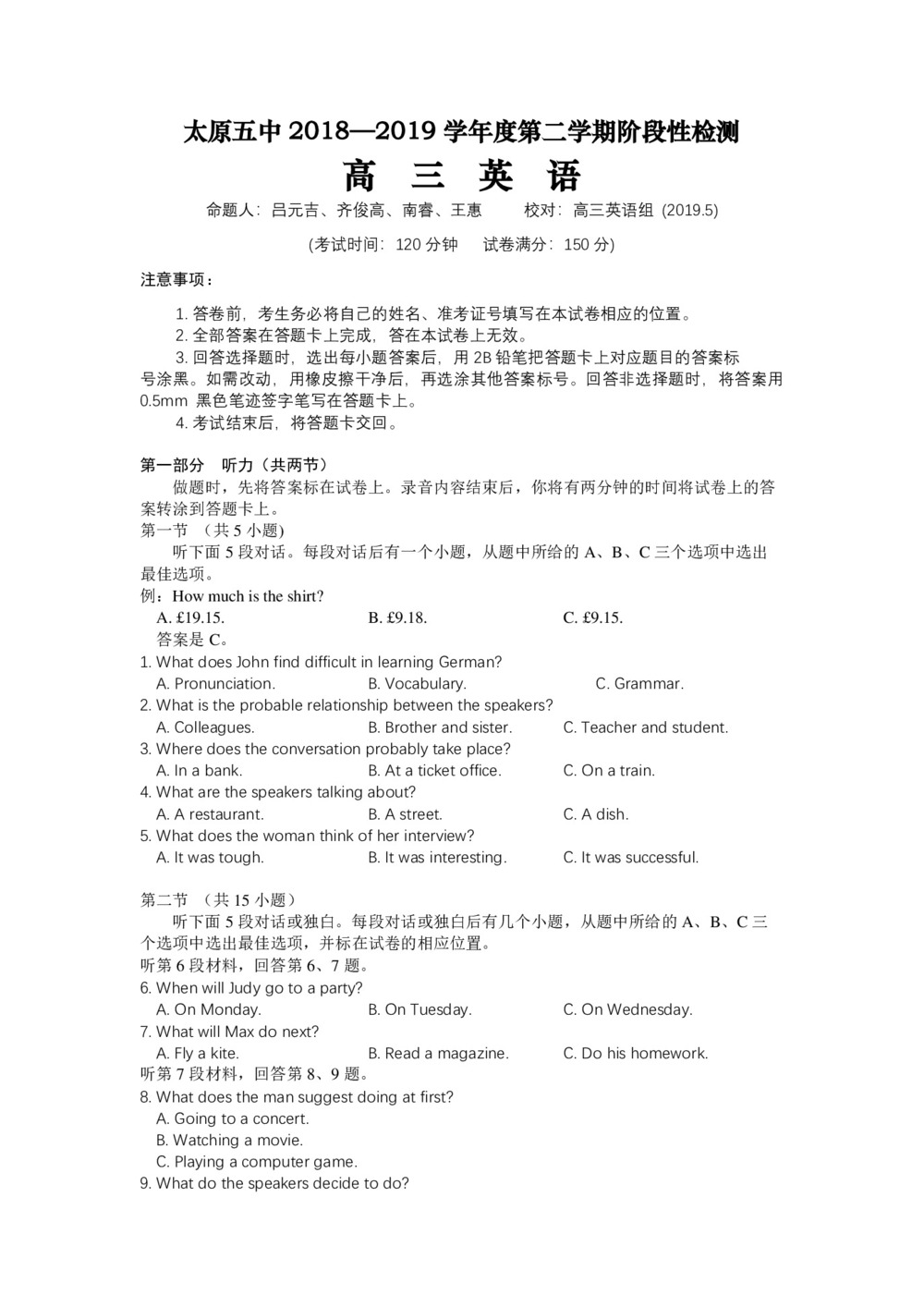
太原五中2018-2019学年度第二学期阶段性检测
高 三 英 语
命题人:吕元吉、齐俊高、南睿、王惠 校对:高三英语组 (2019.5)
(考试时间:120分钟 试卷满分:150分)
注意事项:
1. 答卷前,考生务必将自己的姓名、准考证号填写在本试卷相应的位置。
2. 全部答案在答题卡上完成,答在本试卷上无效。
3. 回答选择题时,选出每小题答案后,用2B铅笔把答题卡上对应题目的答案标
号涂黑。如需改动,用橡皮擦干净后,再选涂其他答案标号。回答非选择题时,将答案用0.5mm 黑色笔迹签字笔写在答题卡上。
4. 考试结束后,将答题卡交回。
第一部分 听力(共两节)
做题时,先将答案标在试卷上。录音内容结束后,你将有两分钟的时间将试卷上的答案转涂到答题卡上。
第一节 (共5小题)
听下面5段对话。每段对话后有一个小题,从题中所给的A、B、C三个选项中选出最佳选项。
例:How much is the shirt?
A. £19.15. B. £9.18. C. £9.15.
答案是C。
1. What does John find difficult in learning German?
A. Pronunciation. B. Vocabulary. C. Grammar.
2. What is the probable relationship between the speakers?
A. Colleagues. B. Brother and sister. C. Teacher and student.
3. Where does the conversation probably take place?
A. In a bank. B. At a ticket office. C. On a train.
4. What are the speakers talking about?
A. A restaurant. B. A street. C. A dish.
5. What does the woman think of her interview?
A. It was tough. B. It was interesting. C. It was successful.
第二节 (共15小题)
听下面5段对话或独白。每段对话或独白后有几个小题,从题中所给的A、B、C三个选项中选出最佳选项,并标在试卷的相应位置。
听第6段材料,回答第6、7题。
6. When will Judy go to a party?
A. On Monday. B. On Tuesday. C. On Wednesday.
7. What will Max do next?
A. Fly a kite. B. Read a magazine. C. Do his homework.
听第7段材料,回答第8、9题。
8. What does the man suggest doing at first?
A. Going to a concert.
B. Watching a movie.
C. Playing a computer game.
9. What do the speakers decide to do?
A. Visit Mike. B. Go boating. C. Take a walk.
听第8段材料,回答第10至12题。
10. Which color do cats see better than humans?
A. Red. B. Green. C. Blue.
11. Why do cats bring dead birds home?
A. To eat them in a safe place.
B. To show off their hunting skills.
C. To make their owners happy.
12. How does the man sound at the end of the conversation?
A. Grateful. B. Humorous. C. Curious.
听第9段材料,回答第13至16题。
13. Who is Macy?
A. Ed's mother. B. Ed's teacher. C. Ed's friend.
14. How does Ed usually go to kindergarten?
A. By car. B. On foot. C. By bus.
15. What does Ed enjoy doing at the kindergarten?
A. Telling stories. B. Singing songs. C. Playing with others.
16. What do the teachers say about Ed?
A. He's clever. B. He's quiet. C. He's brave.
听第10段材料,回答第17至20题。
17. At what age did Emily start learning ballet?
A. Five. B. Six. C. Nine.
18. Why did Emily move to Toronto?
A. To work for a dance school.
B. To perform at a dance theater.
C. To learn contemporary dance.
19. Why did Emily quit dancing?
A. She was too old to dance.
B. She failed to get a scholarship.
C. She lost interest in it.
20. How does Emily feel about stopping training?
A. She's pleased. B. She's regretful. C. She's upset.
-
相关试卷下载
- 1《302edu发布》山西省太原市第五中学2019届高三下学期阶段性检测(4月)英语 Word版含答案
- 2《302edu发布》重庆市第一中学2019届高三下学期4月模拟考试 英语 Word版含答案
- 3《302edu发布》江苏省溧水高级中学2019届高三下学期回归性考试(5月) 英语 Word版含答案(含听力)
- 4《302edu发布》江苏省扬州中学2019届高三下学期开学考试(2月) 英语 Word版含答案
- 5《302edu发布》山西大学附属中学2019届高三下学期4月模块诊断 英语 Word版含答案
- 6《302edu发布》山西大学附中2019届高三下学期3月模块诊断 英语 Word版含答案
- 7《302edu发布》江苏省扬州中学2019届高三下学期4月质量检测 英语 Word版含答案
- 8《302edu发布》江苏省扬州中学2019届高三下学期3月月考英语试题 Word版含答案
- 9《302edu发布》福建省龙海市第二中学2019届高三下学期期初考试 英语 Word版含答案(含听力)